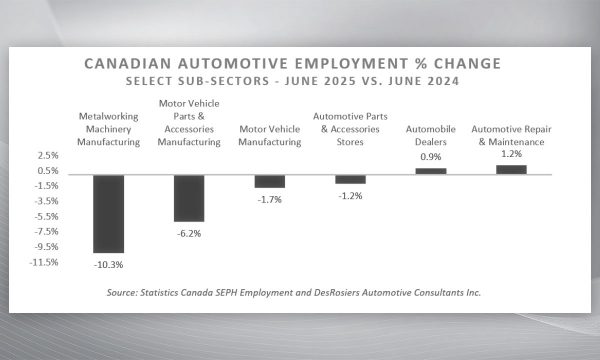
At a time when some OEMs are scaling back their EV launch plans, Toyota Canada said this week it was going to roll out its battery electric vehicle, the Toyota bZ4X, across Canada this year. Until now, the vehicle was only sold through dealerships in British Columbia and Quebec.
Toyota Canada’s newly-named President & CEO, Cyril Dimitris, made the announcement at a media event Wednesday night on the eve of the opening of the Canadian International AutoShow, and in comments in a one-on-one interview with Canadian auto dealer.
“Today, the Toyota bZ4X is one of the best selling SUVs that we see by market share. It’s also a market leader in Quebec,” he said, adding that Canada has already reached the third largest sales volume in the world for the bZ4X with sales in only two provinces.
Dimitris said the company would take their learnings from those two markets and gradually roll out the vehicle to the rest of Canada. “I’m happy to announce that we’ll start doing that later this year,” said Dimitris.
In an interview with Canadian auto dealer, he said the company was working with its dealers to prepare for the wider launch. “We are also in the process of preparing our dealers for that eventuality through product education, and getting facilities ready, and those kinds of things that need to happen in order for them to distribute and service EVs. So that’s an exciting time for us as we work towards that.”
In his remarks at a media event, held at the Steam Whistle brewery and featuring a number of Toyota and Lexus vehicles on display, Dimitris outlined the company’s vision and goals for 2025 and beyond.
Dimitris has worked for Toyota Canada for 37 years in a wide variety of roles before taking the leadership role following the retirement of Larry Hutchinson. Before moving to the company’s top role, he was Vice President, Sales and Marketing at Toyota Canada Inc. (TCI).
He said the company sold nearly 239,000 Toyota and Lexus vehicles in 2024, which is up 5 per cent over 2023 and an overall corporate sales record for the company. “We’re even more proud that we sold a record 117,000 vehicles with electrified power last year. That’s up almost 17 per cent over 2023 with electrified vehicles representing nearly 50 per cent of our total sales in 2024,” he said.
Toyota designates hybrids, plug-in hybrids, pure EVs, and fuel-cell vehicles as their electrified vehicles.
“We’ve embraced the multi-pathway approach to electrification. We offer Canadian drivers a range of electrified power trains, including battery, electric plug-in, hybrid electric, and hydrogen fuel cell electric. Providing this choice of power trains and models makes it easier for drivers to choose the carbon reducing electrified vehicle that best fits their lifestyles and their budgets,” he said.

Cyril Dimitris: Toyota Canada President & CEO
Dimitris told Canadian auto dealer said that Canadians would help drive the electrified market with their choices. “I think to get to where we want to get to as an industry and as a nation, I think we need to allow that to happen organically. And I think when we’ve seen disruption to natural demand, whether it be through incentives or whether it be through mandates, I think what we’re seeing is that those types of measures may kickstart things, but they are not sustainable.”
He told the media and analysts in attendance that the company had an “aggressive schedule to introduce several new and next generation models” this year, before unveiling the all-new 2025 Toyota 4Runner that was set to make its Canadian debut at the show this week. Dimitris also reinforced the company’s commitment to its dealer network.
“Firstly, we believe that the dealers play a hugely important role in interfacing with the consumer while they’re on their purchase journey, while they’re on their ownership journey. So they really form the nexus point for an excellent customer experience,” he said.
“I think that their background and knowledge with hybrids over the last 25 years has set them up in the position of being the trusted source for information as it relates to powertrain choices. And so as our product lineup expands and you get deeper into the buying public, those consumers are trying to educate themselves and they’re trying to understand the differences between the different powertrain options and trying to understand what best meets their needs. And what they’re telling us is that they want to be guided on that journey. They need a place to go for someone to help them through that.”
“So we’re educating our dealers on the various powertrains and product offerings,” he continued. “We’re talking to them about how to properly assess the needs of a consumer and listen to their voice and what they need, and then be able to match that to a product in our lineup, which could be a variety of powertrain options for them.”
During his remarks at the media event, Dimitris also reinforced the company’s deep Canadian roots, having been here for more than 60 years, and their manufacturing footprint. He said Toyota Canada assembled more than 533,000 vehicles in Ontario last year, making it the number one automotive manufacturer in Canada, directly employing more than 8,500 Canadians.
“Toyota has been in Canada for 60 years and we’ve built an incredible cross country ecosystem of talent and infrastructure. We are woven into the fabric of Canadian society and we’re here for the long haul,” he said.













